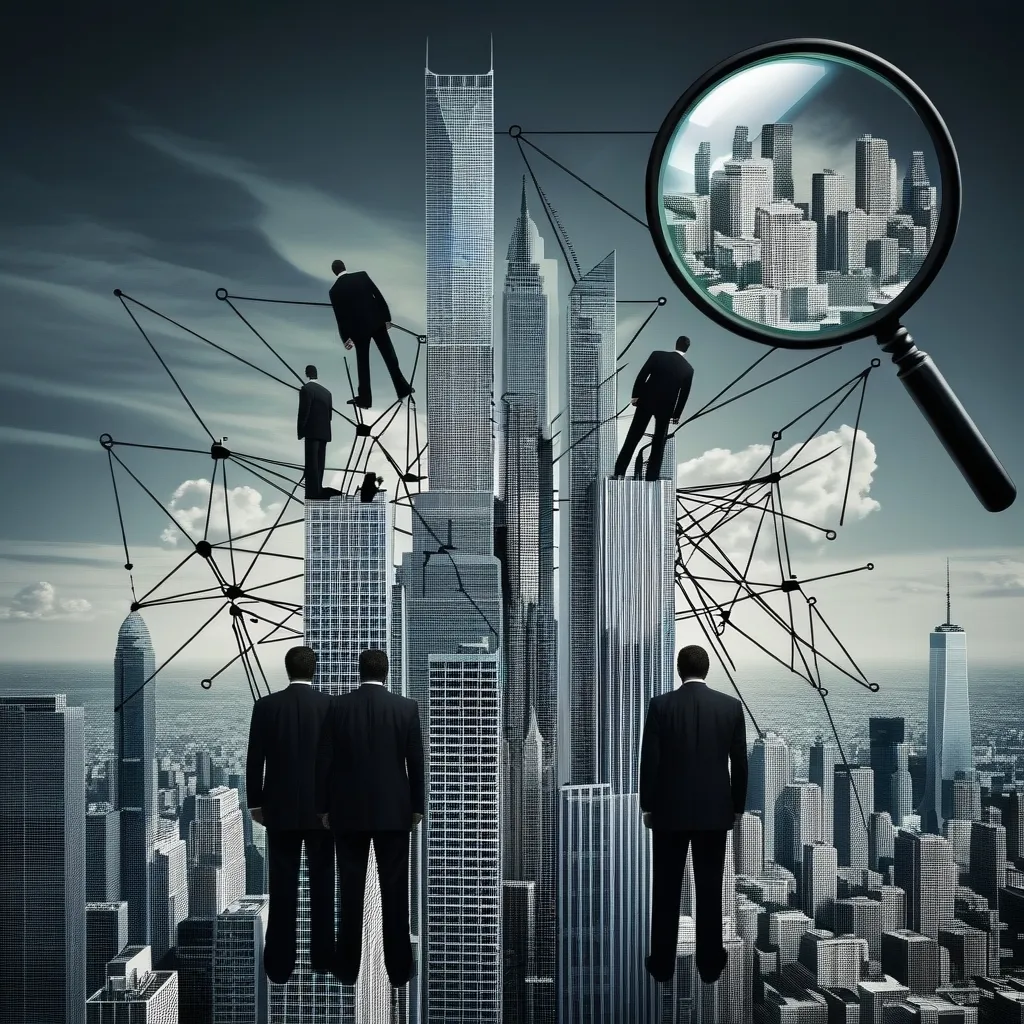Billionaires and Conspiracy Theories: A Match Made in Paranoia
Ever wonder why so many conspiracy theories revolve around billionaires? It’s like the ultra-rich are secretly auditioning for roles as Bond villains or something. But seriously, this fascination with billionaire-centric conspiracies is pretty wild when you think about it.
Let’s dive into the rabbit hole and see what’s really going on here.
First off, our brains are wired to look for patterns and explanations, especially when things get chaotic. And let’s face it, the world can be a pretty messy place. So when someone comes along with a neat little package that explains everything, it’s tempting to grab onto it with both hands.
Enter the billionaire conspiracy theory. These theories offer a simple explanation for complex problems: it’s all because of those darn rich people pulling the strings behind the scenes. It’s like finding the cheat codes to life – suddenly everything makes sense!
But here’s the kicker: it’s not just average Joes buying into these theories. Some billionaires themselves are getting in on the action. Talk about plot twist!
Social media has turned this whole thing into a wildfire. One minute, you’re scrolling through cat videos, and the next, you’re deep into a thread about how Jeff Bezos is actually a lizard person. (Spoiler alert: he’s probably not.) These platforms are like steroids for conspiracy theories, pumping them up and spreading them far and wide.
Take the “Great Reset” theory, for example. It started as a fringe idea but got so big that even mainstream media talking heads were yakking about it. That’s the power of the internet for you – it can turn a whisper into a roar in no time flat.
Now, let’s talk about George Soros. Poor guy can’t catch a break. He’s like the poster child for billionaire conspiracy theories. Every time there’s a protest or a political shift, someone’s pointing the finger at Soros. It’s gotten to the point where you’d think he has a time machine and infinite energy to orchestrate every world event.
But here’s the thing: these theories often play into some pretty nasty stereotypes, especially when it comes to Jewish people. It’s like conspiracy theorists are recycling the greatest hits of antisemitism and slapping a new label on them.
Why do people buy into this stuff? Well, it’s all about confirmation bias. We humans love to hear things that back up what we already believe. If you already think the world is run by a secret cabal, then theories about billionaire masterminds fit right into your worldview like the last piece of a jigsaw puzzle.
And when big shots start peddling these theories? Whew, that’s when things really take off. It’s like getting a celebrity endorsement for your favorite brand of tinfoil hat. Suddenly, what was once a fringe belief becomes the talk of the town.
These theories aren’t just entertaining stories – they fulfill some deep emotional needs. They give people a sense of belonging, like they’re part of an exclusive club that knows the “real truth.” In a world where everything feels out of control, that can be pretty comforting.
But here’s the rub: once someone buys into a conspiracy theory, it’s harder to shake than a bad habit. Evidence against the theory? Must be part of the cover-up! It’s like playing whack-a-mole with facts.
And let’s be real, believing in these theories can mess you up. It’s not just harmless fun. People get stressed, anxious, and sometimes even cut off from friends and family. It’s like voluntarily signing up for a 24/7 worry marathon.
Stepping back from all this conspiracy stuff isn’t easy. It’s like trying to convince someone that their imaginary friend isn’t real – it requires a total shift in how they see the world.
But here’s the million-dollar question: why billionaires? Well, think about it. These folks have more money than most of us can even imagine. They’ve got influence, power, and resources that seem almost supernatural to the average person. It’s not a huge leap to go from “wow, they’re really powerful” to “they must be controlling everything!”
Plus, let’s face it, some billionaires don’t exactly help their case. When you’ve got guys like Elon Musk tweeting cryptic messages at 3 AM, it’s kind of asking for the conspiracy crowd to go wild.
The whole billionaire conspiracy thing is also a way for people to make sense of inequality. When the gap between the ultra-rich and everyone else keeps growing, it’s tempting to think there must be some grand plan behind it all.
But here’s a thought: what if the reality is both simpler and more complex? Maybe there’s no grand conspiracy, just a bunch of flawed humans with too much money trying to navigate a complicated world, sometimes making things better, sometimes worse.
The truth is, the world is messy, complicated, and often doesn’t make sense. Conspiracy theories offer a simple explanation for complex problems. It’s way easier to believe in a shadowy cabal of billionaires controlling everything than to grapple with the chaotic reality of global economics and politics.
So, what can we do about all this? Well, critical thinking is a good start. Question everything – including those juicy conspiracy theories. Look for reliable sources, not just that one YouTube video your cousin’s friend shared.
And let’s not forget empathy. People who believe in these theories aren’t stupid – they’re often scared, confused, or feeling powerless. Understanding where they’re coming from is the first step to having a real conversation.
Education is key too. The more we understand about how the world actually works – economics, politics, science – the less appealing these simplified conspiracy narratives become.
It’s also worth remembering that while billionaires do have a lot of influence, they’re not all-powerful puppet masters. They’re just people – incredibly wealthy people, sure, but still human, with all the flaws and limitations that come with that.
In the end, the world is full of real problems that need solving. Instead of chasing shadows and imaginary plots, we could be focusing on actual issues like climate change, inequality, and social justice. You know, the boring, complicated stuff that doesn’t fit neatly into a conspiracy theory.
So next time you hear a wild theory about how Mark Zuckerberg is secretly a robot controlled by aliens (I mean, have you seen him drink water?), take a step back. Ask questions. Look for evidence. And remember, sometimes the truth is stranger than fiction – but it’s usually a lot more mundane too.
The billionaire conspiracy theory phenomenon says a lot more about us as a society than it does about the billionaires themselves. It’s a mirror reflecting our fears, our frustrations, and our desire to make sense of a world that often seems senseless.
But hey, who knows? Maybe this article is just part of the grand billionaire conspiracy to keep you from discovering the truth. (Spoiler: it’s not. I’m just a regular person who can barely afford avocado toast, let alone world domination.)
So, let’s keep our feet on the ground, our heads out of the clouds, and our tinfoil hats in the recycling bin. The real world is weird and wonderful enough without adding lizard people and secret societies to the mix. And who knows? Maybe by focusing on reality, we can actually make it a bit better – billionaires, conspiracy theories, and all.






